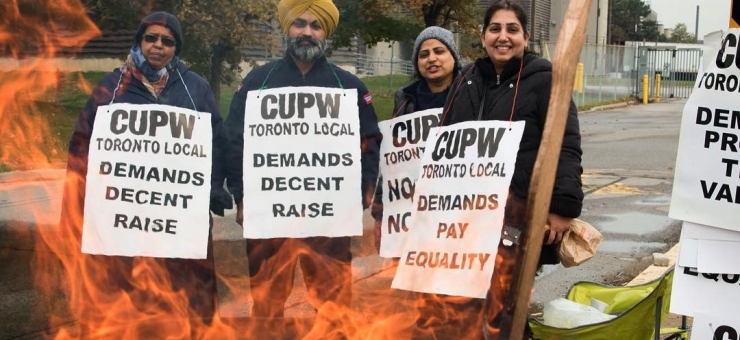Canadian postal workers fight “back to work” legislation in court

The Canadian Union of Postal Workers (CUPW) filed a constitutional challenge this week to block legislation calling them back to work, passed by the country’s Liberal government two weeks ago. The CUPW has been on a rolling strike since late October.
“You cannot legislate labour peace,” says Mike Palecek, CUPW National President. “This law violates our right to free collective bargaining under the Charter of Rights and Freedoms.”
The bill forced postal workers to return to work under their previous collective agreements on November 27, after five weeks of rotating strikes, which means that between then and Christmas:
- At least 315 disabling injuries will happen to postal workers;
- Rural and Suburban Mail Carriers (RSMC) will work roughly 250,000 hours without pay; and
- Urban postal workers will work thousands of hours of forced overtime.
“The real crisis is that Canada Post workers are having their rights trampled while their health and safety is threatened and their wages, not adequately paid,” said Cornelia Broos, Head of UNI Post & Logistics. “The only just way for the Canadian government to end this strike is negotiating safe conditions and fair pay--not heavy-handed, strike-breaking measures.”
UNI Global Union and at nearly 40 unions from over 30 countries have called on the Canadian government to bargain a fair contract with the CUPW.
In 2011, the Conservative government imposed back to work legislation after Canada Post locked out CUPW members for two weeks. It was later determined by Ontario Superior Court Justice Stephen Firestone that the legislation violated the rights to freedom of association and freedom of expression under the Canadian Charter of Right and Freedoms.
In 2015, the Supreme Court of Canada declared the right to strike to be fundamental and protected by the Constitution.
“The Liberal government’s legislation, just like the previous Conservative’s, unilaterally prohibits any lawful strike,” says Paul Cavalluzzo, constitutional lawyer representing CUPW. “Canada Post created a false emergency, the supposed backlog of parcels, to get the government to intervene with back to work legislation. This legislation was enacted under circumstances that did not justify the interference of constitutional rights.”
“Postal workers will continue to defend our right to negotiate fair settlements for all our members,” adds Palecek. “We know that an arbitrated contract will only prolong our problems with injuries, inequality, and overwork.”

